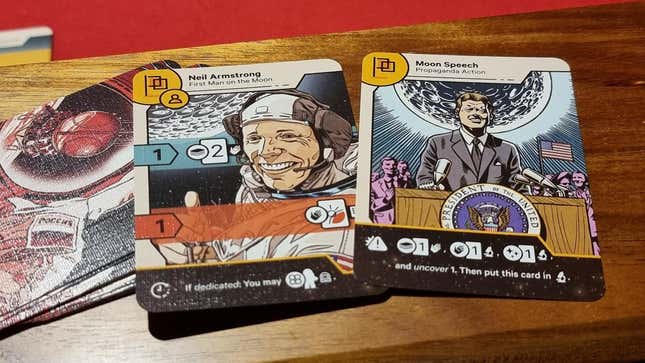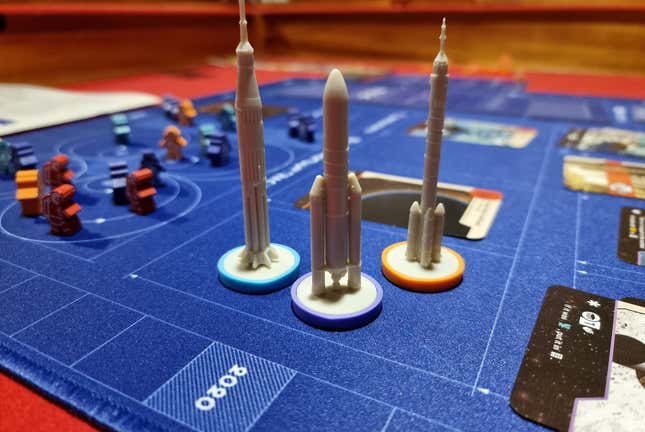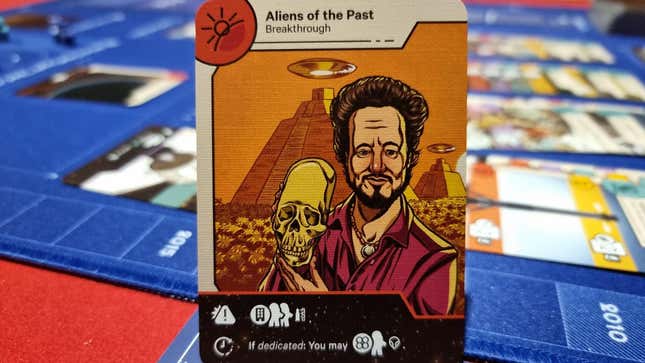I want to get this out of the way up top: I’m someone who can forgive many of a board game’s flaws if it looks good.
While with video games even the prettiest visuals can soon wear thin if the experience itself is lacking, there’s something about an attractive board game’s tactile joys, its physical allure, that really pushes my buttons. Is this superficial? Probably! But, and I cannot stress this enough given my honesty in revealing my critical bias, it is what it is.
And Space Race is a board game that looks good. Designed for 1-5 players, it has everyone taking on the role of either a space-faring nation (like the US or Soviet Union) or a private sector company, and basically just playing a whole bunch of cards in order to undertake research, get astronauts (or cosmonauts) into space, complete missions and, after just seven turns, jostling to be the faction furthest along a progress tracker and be declared the winner.
Despite all the scientific designs all over the place, it isn’t a complicated game. You’re really doing little more than drawing cards and playing them on the table, building an engine that must be modified every turn by adding new cards to it, which then changes its outcome on the missions or challenges you’re trying to complete in order to gain points (and thus move along the progress tracker).
I’m not going to get into the reeds on the game’s rules, that’s not what these reviews are for (you can check them out yourself if you want), but I did find the game pretty easy to pick up and develop strategies for even during my first playthrough, something that doesn’t actually happen too often with me (I usually like/need to test the waters once or twice with a game I’m not familiar with before feeling confident enough to shoot for clear strategies).
It’s far from my favourite game of the last few years on the mechanical side of things—I found a lot of Space Race’s peripheral systems can be ignored without much consequence, which limited a bit of its complexity and depth—but it was generally a pretty breezy game to play as I shifted and adjusted my cards every turn to try and squeeze new ways of getting points out of the board.
I still loved every second I spent with it, though, because of just how nice everything is. Space Race’s art is split into two entirely different camps; there’s its graphic design, comprising the board and tokens, that commits 100% to a rocket scientist aesthetic, making the entire thing look like a series of blueprints. It’s plain, but also clean and entirely appropriate for the subject matter, so I dig it.

The other half is the game’s card art, and it is a joy to behold. Every single card in the game, from “celebrities” like JFK to mundane missions to vital pieces of technology to representations of mission control rooms is a gorgeous illustration, bursting with colour and character, and for the first few turns of this game I couldn’t help but just sit there staring at every single one of them, fighting my brain’s impulses to treat the prettiest card images as the “best” cards even if they were just low-scoring filler.

Adding to the sensory delights playing this game was the quality of the components themselves. While the game’s meeples are fairly plain, the included plastic rocket tokens are detailed and the cards printed on thick, glossy stock. The real star, surprisingly, is the board itself (above), which is a mousepad-like foam mat that shimmers under lights, and is a wonderful thing to have to be pressing down on and rubbing your hands over all night.
The game also, to its credit, even has room for a sense of humour amidst all the cold scientific progress:

If you’re a fan of mid-weight (games that aren’t all-nighters but aren’t quick finishes either), engine-building board games that are fairly easy to pick up, then sure, Space Race is a fun game. But if like me you’re someone who cherishes a board game’s physical pleasures as much as its intellectual rigours, then this is something you should definitely try and get a game of. Probably with someone who already has a copy, since the fact this was Kickstarted without a retail release makes it hard to find a new copy of your own.





